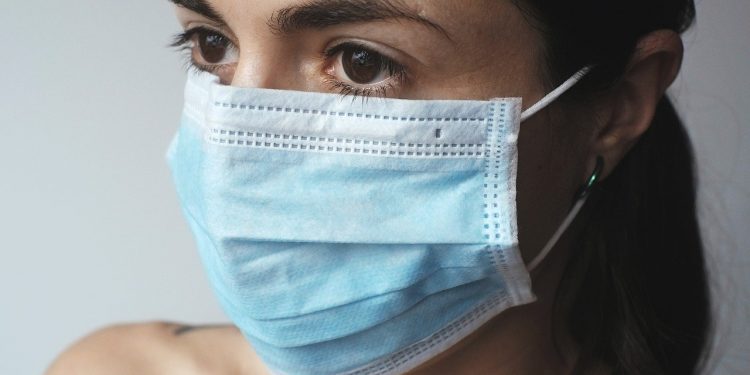Unique Danish research to examine and certify the utility of masks
As several European countries impose the use of facemasks as part of their opening strategy, Danish researchers seek to find evidence that it works.
The article continues below.
By Bente D. Knudsen
With 6,000 participants, it will be the largest study in the world of the utility of wearing facemasks outside your home in order to reduce the risk of spread of a virus during an epidemic.
Moreover, the study is a fast working one, with preliminary results present in a month’s time.
The research has been made possible by the donation of DKK 5 million from the Salling Foundation (the owners of amongst other Bilka, Føtex and Netto) combined with the willingness of employees and customers in the supermarkets of the Salling Group to participate.
The participants have taken part in a lottery to ascertain which group they were to be in. 3,000 are in the group wearing a facemask whenever they leave their home and the other 3,000 are not to wear one. The participants must leave their home minimum three hours a day – reason why the employees of the supermarkets are important participants.
The research study is done in cooperation with four hospitals in the Copenhagen Region.
Many expats will have noticed that during this epidemic outbreak the Danish health authorities are not recommending the use of facemasks at present (contrary to for instance France, Austria and Germany) and the research is to validate whether healthy people wearing facemasks outside of hospitals can help reduce spread.
The article continues below.
According to one of the project’s researchers, professor and Doctor Henning Bundgaard from Rigshospitalet, the study will be able to contribute with valuable knowledge, which at present does not exist, about the potential of facemasks.
“If this study shows that a simple and relatively cheap measure such as a facemask can reduce the spread of COVID-19, this will save lives as well as resources in the health sector. And it will potentially contribute in an important way to the re-opening of the society; if the participants in the study are protected from infection by wearing a facemask this will be valid in Denmark as well as elsewhere,” Henning Bundgaard says in a press release about the research project.
Four professors are involved in the project; Doctor Christian Torp-Pedersen from Nordsjællands Hospital, Doctor Thomas Benfield from Hvidovre Hospital and Doctor Henrik Ullum from Rigshospitalet as well as Doctor Kasper Iversen from Herlev-Gentofte Hospital.
The article continues below.
According to Kasper Iversen there are several challenges combined with wearing facemasks and it does not necessarily give a full protection against a virus.
“Many people find it difficult to be consequent and wear a facemask all the time. In some instances, it does not fit tightly enough around the mouth and at the same time, it can only be used for a maximum of eight hours before it must be changed. Maybe an increase in the use of facemasks is part of the solution but we need a good scientific study which can clarify the effect of using facemasks.”
In an interview with P3, one of the researchers, Doctor Thomas Benfield from Hvidovre Hospital, said that:
At present there is not any scientific evidence that facemasks used by healthy people outside of their homes has an effect on the spread of an epidemic.
The many Asian countries which use facemasks have not provided the Danish researchers with any evidence, or at least nothing has been published, which the Danish researches have been able to gain access to.
Based on a Japanese study of schoolchildren, which showed that by wearing facemasks, school children could reduce the risk of getting the flu by 15 percent, the Danish researchers work with the thesis that facemasks do make a difference and this is what they want to certify with the large scale scientific research project.
The article continues below.
COVID-19 spreads primarily by droplets believed transmitted to the mouth and from there it spreads to the respiratory system and the stomach. Virus can be transmitted by physical contact and from contact points – when a person touches the contact point and subsequently touch their mouth.
A study amongst medical students showed that they touch their face on average 23 times per hour and that in 44 percent of the cases, they even touched their mucous membrane (mouth saliva).
The article continues below.
Support our magazine with a contribution of any size
We do not want to put up a pay-wall, so we need your support and if you find our content relevant and worthwhile, we would value any contribution, however big or small, as a token of your appreciation of our efforts.
How to support:
Transfer any contribution to our bank account at: Your Danish Life/ Danish Expat Media Aps
Danske Bank Account number: 3409 11405673
IBAN: DK68 3000 0011 4056 73
or MobilePay to 2144 1224
Message: Support
About the Facemask project:
The 6,000 participants will be tested for both COVID-19 and for antibodies to certify that they are not ill and have not been ill before participating.
The participants are to test themselves during the research period and send the samples to the researchers for examination. The research is expected to last a month in the period mid-April to mid-May after which all the results will be analysed.
The samples will be tested for both SARS-CoV-2 and four other minor variations of coronavirus as well as for influenza A and B viruses.
Responsible for the unit performing the analysis of the samples and the testing are Senior researcher Kerstin Skovgaard fom Institut for Bioteknologi and Biomedicin, Danmarks Tekniske Universitet and Senior researcher Ramona Trebbien, Virus & Mikrobiologisk Specialdiagnostik / Virus Overvågning and Forskning, Statens Serum Institut.
The research is supported by Salling Fondene and the Salling Group.


